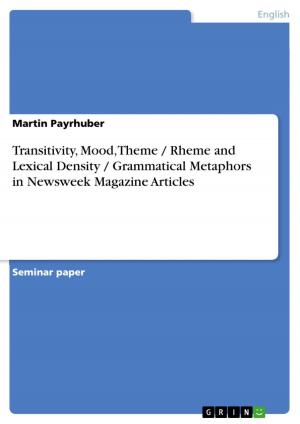| Author: | Stefan Bode | ISBN: | 9783638623940 |
| Publisher: | GRIN Publishing | Publication: | March 10, 2007 |
| Imprint: | GRIN Publishing | Language: | English |
| Author: | Stefan Bode |
| ISBN: | 9783638623940 |
| Publisher: | GRIN Publishing |
| Publication: | March 10, 2007 |
| Imprint: | GRIN Publishing |
| Language: | English |
Seminar paper from the year 2007 in the subject Business economics - Revision, Auditing, grade: 1,0, University of Glamorgan, course: International Accounting & Auditing, 47 entries in the bibliography, language: English, abstract: This essay provides an analysis of the many hurdles in the process of truly harmonised international auditing standards. The method of analysis for this essay included a review of the current literature available in libraries and on the internet. The cultural barriers are regarded as the most difficult to overcome since they comprise of people's behaviours as well as languages. Further, it is stated that the translation process is one of the major hurdles since words in different languages are not equivalent to the English ones. Moreover, cultural diversity may also cause a general resistance as the standards are dictated by big audit firms. Additionally, the IFAC is mainly influenced by the USA and the EU which might continue to cast a damning light on the ISA. Alternatively, the level of education and the lack of professional auditing bodies in some developing countries embody the social problems. The political hurdles contain the pride of sovereignty and the political system of countries. Additionally, governments are reluctant to abandon their right to prescribe the standards for professions. Furthermore, it will also be difficult to find a majority in the national parliaments because current national standard-setters or representatives from businesses might exert pressure on the members of parliament to reject ISA. On the other hand, differences in national legislation as well as in the legal system are the main part of legal obstacles. Nowadays, a marked distinction can be drawn between the common law which is predominant in Anglo-Saxon countries and the codified law which is applied in many European continental countries. Beyond this, differences in the effectiveness of countries legal structure and national regulations like auditors' liability, accounting rules also adversely impair the harmonisation process. Lastly, the economic hurdles are characterised by different user orientation of financial statements and the stages of technological developments. Further, auditors in developed countries need other standards as their counterparts in developing countries due to the growth of e-commerce and e-business. Finally, it is concluded that truly harmonised standards may not be feasible because of the many differences between countries. It seems more important to achieve a minimum set of international auditing standards as unitary standards generate many benefits.
Seminar paper from the year 2007 in the subject Business economics - Revision, Auditing, grade: 1,0, University of Glamorgan, course: International Accounting & Auditing, 47 entries in the bibliography, language: English, abstract: This essay provides an analysis of the many hurdles in the process of truly harmonised international auditing standards. The method of analysis for this essay included a review of the current literature available in libraries and on the internet. The cultural barriers are regarded as the most difficult to overcome since they comprise of people's behaviours as well as languages. Further, it is stated that the translation process is one of the major hurdles since words in different languages are not equivalent to the English ones. Moreover, cultural diversity may also cause a general resistance as the standards are dictated by big audit firms. Additionally, the IFAC is mainly influenced by the USA and the EU which might continue to cast a damning light on the ISA. Alternatively, the level of education and the lack of professional auditing bodies in some developing countries embody the social problems. The political hurdles contain the pride of sovereignty and the political system of countries. Additionally, governments are reluctant to abandon their right to prescribe the standards for professions. Furthermore, it will also be difficult to find a majority in the national parliaments because current national standard-setters or representatives from businesses might exert pressure on the members of parliament to reject ISA. On the other hand, differences in national legislation as well as in the legal system are the main part of legal obstacles. Nowadays, a marked distinction can be drawn between the common law which is predominant in Anglo-Saxon countries and the codified law which is applied in many European continental countries. Beyond this, differences in the effectiveness of countries legal structure and national regulations like auditors' liability, accounting rules also adversely impair the harmonisation process. Lastly, the economic hurdles are characterised by different user orientation of financial statements and the stages of technological developments. Further, auditors in developed countries need other standards as their counterparts in developing countries due to the growth of e-commerce and e-business. Finally, it is concluded that truly harmonised standards may not be feasible because of the many differences between countries. It seems more important to achieve a minimum set of international auditing standards as unitary standards generate many benefits.















